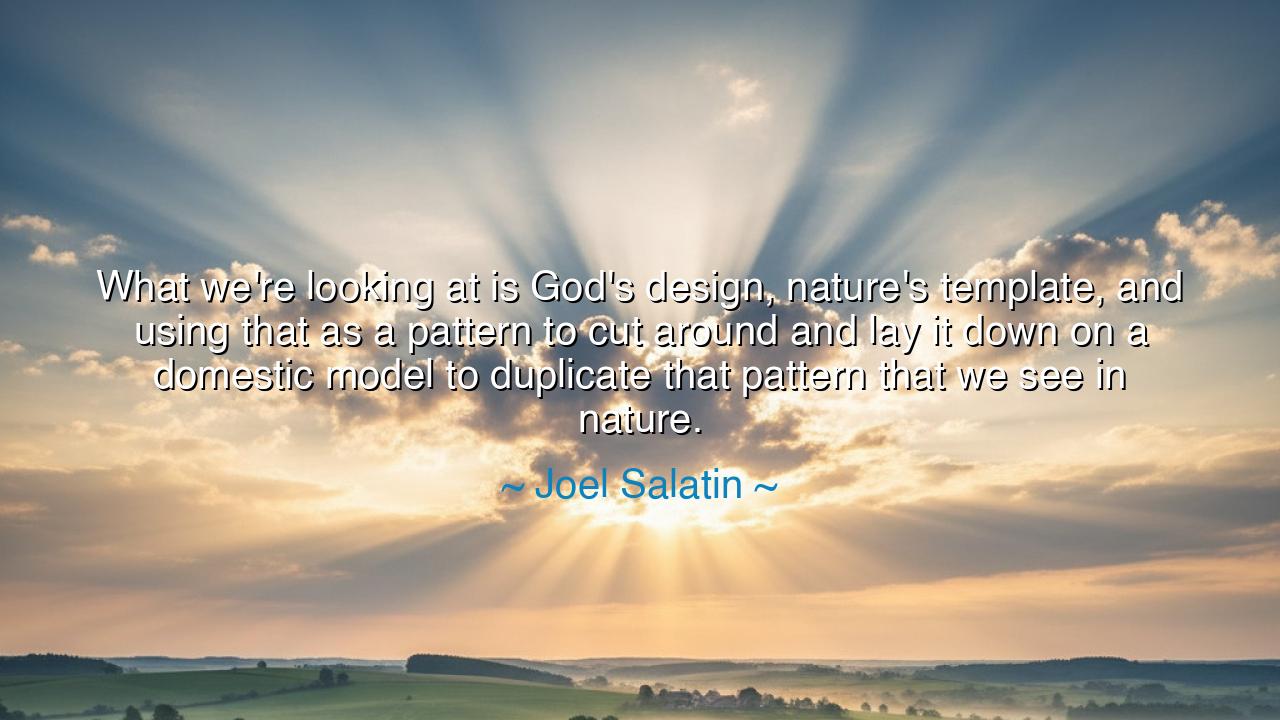
What we're looking at is God's design, nature's template, and
What we're looking at is God's design, nature's template, and using that as a pattern to cut around and lay it down on a domestic model to duplicate that pattern that we see in nature.






“What we're looking at is God's design, nature's template, and using that as a pattern to cut around and lay it down on a domestic model to duplicate that pattern that we see in nature.” — Joel Salatin
So spoke Joel Salatin, the farmer-philosopher whose hands are calloused by earth but whose mind is shaped by heaven. In this saying, he reminds us that the greatest teacher is not the laboratory nor the city, but nature itself — the first and purest expression of God’s design. His words are not about farming alone, but about the eternal harmony between creation and stewardship, between the divine blueprint of life and the humble duty of humankind to follow it with reverence. To “duplicate that pattern” is to walk in rhythm with the Creator, not as conquerors of the soil, but as its caretakers.
Since the dawn of civilization, humans have looked upon the natural world with both awe and arrogance. Some sought to control it, bending rivers, clearing forests, and breeding crops to serve their own ends. Others, the wiser few, sought to learn from it — to see how life sustains itself in perfect balance. Salatin stands in the lineage of these wise ones. Like the ancient Taoists who spoke of the Way, or the Native elders who called the earth their mother, he sees that the order of nature is divine, that the patterns of the forest, the meadow, and the river are not random, but sacred codes for survival and abundance.
In saying that we should “lay it down on a domestic model,” Salatin calls us to apply the wisdom of the wild to the realm of human living — to build our homes, our farms, and our societies as reflections of nature’s balance. Consider how the forest renews itself: trees fall, decay, and feed the soil that gives birth to new life. The cycle is perfect and complete; nothing is wasted. So too, he teaches, should our way of life follow this design — to give back what we take, to reuse what we discard, to see no separation between humanity and the earth that sustains it.
This truth has been echoed across the ages. The ancient Egyptians built their irrigation systems by observing the floods of the Nile, understanding that timing and rhythm, not force, governed the river’s gift. The Mayans planted maize, beans, and squash together, mimicking the companionship of species that thrives in the wild — each plant strengthening the others. These civilizations flourished not through domination, but through obedience to nature’s pattern. When they forgot this sacred law, when greed outweighed reverence, their empires crumbled and their fields turned to dust.
In our modern age, humanity has strayed far from that divine pattern. We poison the rivers that once gave us drink; we strip the land that once gave us food; we treat the living soil as dead matter. We have traded the pattern of creation for the illusion of control. But Salatin’s voice rises like that of an ancient prophet, reminding us that every act against nature is an act against ourselves. When we ignore the template of life, we sow chaos — in the earth, in the climate, and in the human heart. The remedy is not more machinery or mastery, but humility — the willingness to see that the world’s wisdom far exceeds our own.
Look then to the farm of Joel Salatin himself, Polyface Farm, where cows graze not in confinement but in rotation, where chickens follow the herds to cleanse the pasture, where waste becomes nourishment, and every creature has its purpose. This is God’s pattern made visible — the dance of creation replayed on human soil. And in that dance lies a great truth: when we align our labor with the natural order, abundance flows effortlessly. The earth rejoices, and humanity is fed — body, mind, and spirit.
So, O children of the earth, take this lesson to heart: seek harmony, not mastery. Let your hands follow the rhythm of nature’s song. Before you build, observe; before you sow, listen; before you take, give thanks. For the design of the universe is already perfect — we are only its apprentices. Live, then, as co-creators, not as tyrants. Walk the land gently, shape it with care, and let your homes, your gardens, and your hearts reflect the divine architecture of life.
In doing so, you will not only preserve the world — you will become one with its sacred order, living proof that the greatest wisdom is not invented by man, but discovered in the patterns of the earth and the hand of God that shaped them.






AAdministratorAdministrator
Welcome, honored guests. Please leave a comment, we will respond soon